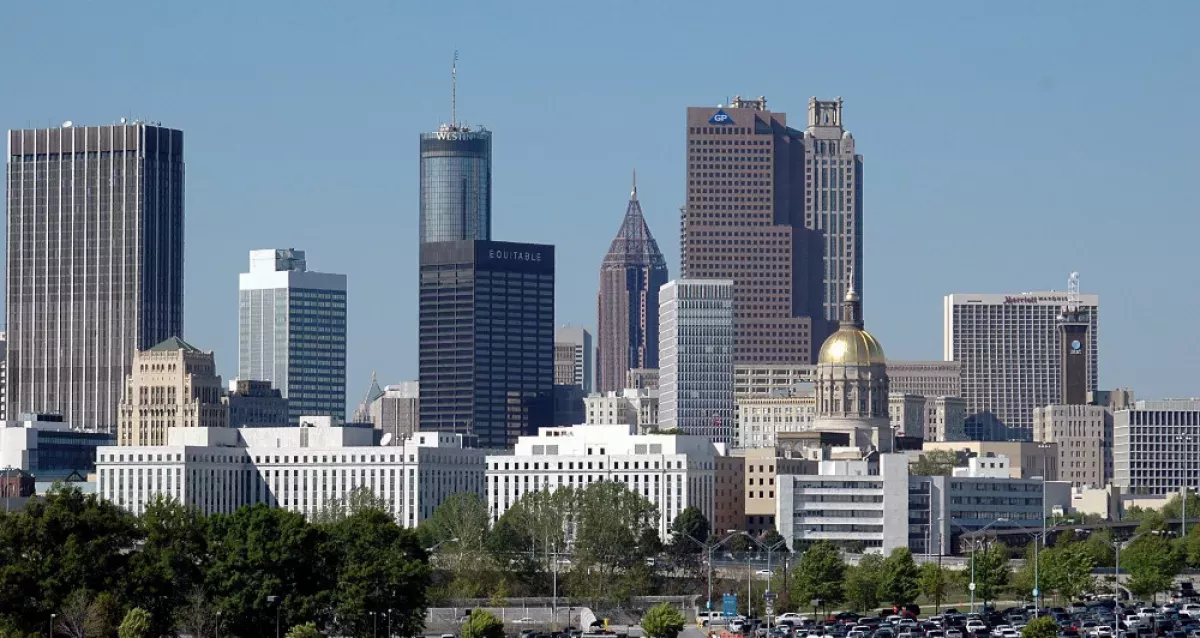Atlanta is the capital and most populous city of Georgia, serving as the county seat of Fulton County while extending into DeKalb County. As of 2020, its population was 498,715, estimated at 520,070 in 2024, making it the eighth-largest city in the Southeast and 36th nationally. Classified as a Beta + global city, Atlanta's metropolitan area boasts over 6.4 million residents, ranking as the eighth-largest in the U.S. Located in the Appalachian foothills at over 1,000 feet above sea level, Atlanta is known for its hilly terrain, abundant greenery, and dense urban tree coverage.
1902: Construction of the Carnegie Library
The Carnegie Library was built in 1902.
1905: Construction of Terminal Station
Terminal Station was built in 1905.
1906: Atlanta Race Riot
In 1906, increased racial tensions culminated in the Atlanta Race Riot, where Whites attacked Blacks, resulting in at least 27 deaths and over 70 injuries, with extensive damage in Black neighborhoods.
1913: Leo Frank convicted of murder
In 1913, Leo Frank, a Jewish-American factory superintendent, was convicted of the murder of a 13-year-old girl in a highly publicized trial and sentenced to death.
1914: Braves win their first World Series as the Boston Braves
In 1914, the Braves won their first World Series as the Boston Braves.
1915: Leo Frank lynched in Marietta
In 1915, Leo Frank was taken from jail by an organized lynch mob and hanged in Marietta, horrifying the Jewish community in Atlanta and across the country.
May 21, 1917: The Great Atlanta Fire
On May 21, 1917, the Great Atlanta Fire destroyed 1,938 buildings in what is now the Old Fourth Ward, causing one death and displacing 10,000 people.
December 15, 1939: Premiere of Gone with the Wind in Atlanta
On December 15, 1939, Atlanta hosted the premiere of the movie "Gone with the Wind", based on the novel by Margaret Mitchell. The film's producer, David O. Selznick, and stars Clark Gable, Vivien Leigh, and Olivia de Havilland, attended the gala. Hattie McDaniel was barred due to segregation laws.
1939: Release of Gone With the Wind
In 1939, the movie Gone With the Wind, which is set in Atlanta, was released.
January 23, 1940: Heaviest Snowfall
On January 23, 1940, Atlanta experienced its heaviest single snowfall, with around 10 inches (25 cm) of snow.
1946: Founding of the Atlanta Hawks as the Tri-Cities Blackhawks
In 1946, the Atlanta Hawks were founded as the Tri-Cities Blackhawks, playing in Moline, Illinois.
1948: First African-American police officers hired
In 1948, the mayor of Atlanta ordered the hiring of the first eight African-American police officers in the city in exchange for support from the Black community that could vote.
1950: Merger of Newspapers
In 1950, The Atlanta Journal and The Atlanta Constitution merged to form The Atlanta Journal-Constitution.
1956: Controversy precedes the Sugar Bowl
In 1956, controversy surrounded the Sugar Bowl game between Pitt Panthers and Georgia Tech Yellow Jackets due to the presence of African-American player Bobby Grier. Governor Marvin Griffin opposed racial integration, leading to protests and riots. The Georgia Tech board of regents voted to allow the game to proceed.
1956: Film to be produced about 1956 Sugar Bowl and riots
In 2022, it was announced that a film about the 1956 Sugar Bowl and '56 Atlanta riots would be produced in Atlanta.
1957: Braves win World Series as the Milwaukee Braves
In 1957, the Braves won the World Series as the Milwaukee Braves.
1959: Public transportation desegregated
In 1959, public transportation was desegregated in Atlanta.
1960: Whites comprise 61.7% of the city's population
In 1960, Whites made up 61.7% of Atlanta's population.
1961: Road barriers erected in Cascade Heights
In 1961, Atlanta attempted to thwart blockbusting by realtors by erecting road barriers in Cascade Heights, countering efforts to foster Atlanta as the "city too busy to hate."
1961: Restaurant at Rich's department store desegregated
In 1961, the restaurant at Rich's department store was desegregated in Atlanta.
1963: Movie theaters desegregated
In 1963, movie theaters were desegregated in Atlanta.
1966: Atlanta Falcons inception
In 1966, the Atlanta Falcons team played their first season in Atlanta.
1966: The Braves move to Atlanta
In 1966, the Braves moved to Atlanta.
1966: State of Georgia Building Constructed
In 1966, the State of Georgia Building was constructed, exemplifying Atlanta's embrace of modern architecture during the late 20th century.
1967: Professional soccer begins in Atlanta
In 1967, Professional soccer was first played in Atlanta.
1967: Robert Shaw becomes music director of the Atlanta Symphony Orchestra
In 1967, Robert Shaw became the music director of the Atlanta Symphony Orchestra.
1968: Atlanta Chiefs win the NASL Championship
In 1968, the Atlanta Chiefs of the original North American Soccer League won the NASL Championship.
1968: The Hawks move to Atlanta
In 1968, the Hawks moved to Atlanta from St. Louis and began playing their games in State Farm Arena.
1969: Atlanta International Pop Festival
In 1969, Atlanta hosted the Atlanta International Pop Festival, featuring many of the same bands as Woodstock.
1970: African Americans become the majority of the city's population
By 1970, African Americans constituted the majority of Atlanta's population.
1971: Demolition of the Equitable Building
In 1971, the Equitable Building, which was constructed in 1892, was demolished in Atlanta. This reflects the city's ambivalent approach to historic preservation.
1972: Demolition of Terminal Station
In 1972, Terminal Station, which was built in 1905, was demolished in Atlanta. This reflects the city's ambivalent approach to historic preservation.
1972: Atlanta Flames begin playing
In 1972, the Atlanta Flames began playing, later relocating to Calgary in 1980.
January 7, 1973: Severe Ice Storm
On January 7, 1973, Atlanta experienced its most severe ice storm.
1973: Significant loss of tree canopy coverage
Between 1973 and 1999, Atlanta experienced a significant loss of tree canopy coverage.
1973: Black Mayors
Every mayor elected since 1973 in Atlanta has been Black.
1973: Maynard Jackson elected as Atlanta's first Black mayor
In 1973, Maynard Jackson was elected as Atlanta's first Black mayor.
1973: Public schools desegregated
In 1973, public schools were desegregated in Atlanta, nearly 20 years after the Supreme Court ruling.
1974: Tree Cover Percentage
In 1974, Atlanta's tree cover was 48%.
1975: Construction of the city's subway system begins
In 1975, construction of Atlanta's subway system began.
1975: Freeway opposition halts development
In 1975, neighborhood opposition successfully prevented two freeways from being built through the city's east side, which became the starting point for Atlanta's gentrification.
1976: Lynyrd Skynyrd records 'Free Bird' live at the Fox Theatre
In 1976, Lynyrd Skynyrd's famous live rendition of "Free Bird" was recorded at the Fox Theatre in Atlanta.
1976: Opening of the Georgia World Congress Center
In 1976, the Georgia World Congress Center opened, further establishing Atlanta as a convention city.
1977: Demolition of the Carnegie Library
In 1977, the Carnegie Library, which was constructed in 1902, was demolished in Atlanta. This reflects the city's ambivalent approach to historic preservation.
1977: Release of Smokey and the Bandit
In 1977, the movie Smokey and the Bandit, which is set in Atlanta, was released.
1979: Rail service commences
In 1979, rail service commenced in Atlanta.
1979: Release of The Dukes of Hazzard
In 1979, the movie The Dukes of Hazzard, which is set in Atlanta, was released.
1980: Falcons win division title
In 1980, the Atlanta Falcons won the division title.
1980: Atlanta Flames relocate to Calgary
In 1980, the Atlanta Flames relocated to Calgary.
1981: Release of Sharky's Machine
In 1981, the movie Sharky's Machine, which is set in Atlanta, was released.
1982: Staff Consolidation
In 1982, staff consolidation occurred at The Atlanta Journal-Constitution.
1982: Georgia-Pacific Tower Constructed
In 1982, the Georgia-Pacific Tower was constructed. The building is an example of Atlanta's embrace of modern architecture during the late 20th century.
1985: Release of The Slugger's Wife
In 1985, the movie The Slugger's Wife, which is set in Atlanta, was released.
1985: Founding of Trees Atlanta
Trees Atlanta, a non-profit organization, was founded in 1985 to address tree loss.
1987: One Atlantic Center Built
In 1987, One Atlantic Center was built. It is one of Atlanta's tallest skyscrapers built in the postmodern style, displaying tapering spires or ornamented crowns.
1988: Yoel Levi becomes music director of the Atlanta Symphony Orchestra
In 1988, Yoel Levi became the music director of the Atlanta Symphony Orchestra, succeeding Robert Shaw.
1989: Release of Driving Miss Daisy
In 1989, the movie Driving Miss Daisy, which is set in Atlanta, was released.
1990: Atlanta lost over 100,000 residents
Between 1970 and 1990, Atlanta lost more than 100,000 residents.
1990: African Americans at 67% of the population
In 1990, African Americans made up 67% of Atlanta's population.
1990: Atlanta awarded the Olympic games
In 1990, after Atlanta was awarded the Olympic games, gentrification expanded into other parts of the city, stimulated by infrastructure improvements undertaken in preparation for the games.
1990: Black Flight Begins
In the 1990s, Atlanta started to experience Black flight, where African Americans moved outside the city seeking a lower cost of living or better public schools.
1991: 191 Peachtree Tower Built
In 1991, 191 Peachtree Tower was built. It is one of Atlanta's tallest skyscrapers built in the postmodern style, displaying tapering spires or ornamented crowns.
1991: Start of the Braves' run of 14 straight divisional championships
The Atlanta Braves' unprecedented run of 14 straight divisional championships started in 1991 and lasted until 2005.
1992: Four Seasons Hotel Atlanta and Bank of America Plaza Completed
In 1992, the Four Seasons Hotel Atlanta and the Bank of America Plaza were completed. The Bank of America Plaza, at 1,023 feet, is the tallest building in the city.
1993: Citywide Ordinance Imposed on Developers
In 1993, a citywide ordinance was imposed on developers removing trees on their property.
1994: Renee Lewis Glover becomes CEO of Atlanta Housing Authority
In 1994, Renee Lewis Glover became CEO of the Atlanta Housing Authority.
1996: Centennial Summer Olympics
Atlanta hosted the Centennial Summer Olympics in 1996.
1996: Atlanta hosts the Summer Olympic Games
In 1996, Atlanta hosted the Summer Olympic Games. None of the $1.7 billion cost was governmentally funded. All invited national Olympic committees sent athletes, sending more than 10,000 contestants participating in 271 events.
1996: Tree Cover Percentage
In 1996, a study found Atlanta's tree cover had declined to 38%.
1996: Investments Initiated by the Summer Olympics
In 1996, the non-Hispanic White population of Atlanta began to rebound after several decades of White flight to Atlanta's suburbs, as a result of the investments initiated by the Summer Olympics.
1996: Home prices reach levels not seen since 1996
In January 2012, home prices dropped to levels not seen since 1996.
1996: Atlanta Housing Authority demolishes public housing
In the lead-up to the 1996 Summer Olympics, the Atlanta Housing Authority demolished nearly all of its public housing and provided residents with vouchers for private housing.
1996: Centennial Olympic Park Legacy
The Centennial Olympic Park remains as a legacy of the 1996 Summer Olympics, forming the centerpiece of the city's tourist district.
1998: Atlanta Silverbacks are formed
In 1998 the Atlanta Silverbacks were formed, playing in the new North American Soccer League.
1998: Hartsfield-Jackson International Airport becomes world's busiest
In 1998, Hartsfield-Jackson International Airport became the world's busiest airport in terms of passenger traffic.
1998: Falcons win division title and NFC championship
In 1998, the Atlanta Falcons won the division title and the NFC championship.
1999: Significant loss of tree canopy coverage
Between 1973 and 1999, Atlanta experienced a significant loss of tree canopy coverage.
1999: Falcons lose Super Bowl XXXIII
In 1999, the Atlanta Falcons lost to the Denver Broncos in Super Bowl XXXIII.
1999: Atlanta Thrashers begin playing
In 1999, the Atlanta Thrashers began playing, later relocating to Winnipeg in 2011.
2000: Atlanta Housing Authority eradicates public housing
After 2000, new development was aided by the Atlanta Housing Authority's eradication of the city's public housing, allowing development of sites for mixed-income housing and providing vouchers for former residents.
2000: Strong Growth of Whites in the City
Between 2000 and 2020, the proportion of Whites in Atlanta had strong growth, increasing from 33% to 39% of the city's population.
2000: Atlanta gains white, asian and hispanic residents
From 2000 to 2010, Atlanta gained 22,763 white residents, 5,142 Asian residents, and 3,095 Hispanic residents.
2000: End of Yoel Levi's tenure as music director
In 2000, Yoel Levi's tenure as music director of the Atlanta Symphony Orchestra came to an end.
2000: Percentage of Cycling Commutes
In 2000, cycling comprised 0.3% of all commutes in Atlanta.
2001: Study of Tree Cover Decline
A 2001 study found Atlanta's heavy tree cover declined from 48% in 1974 to 38% in 1996.
2001: Crime Rate Decrease
Between 2001 and 2009, the Atlanta Police Department (APD) oversaw a 40% decrease in the city's crime rate.
2001: Robert Spano becomes music director of the Atlanta Symphony Orchestra
In 2001, Robert Spano became the music director of the Atlanta Symphony Orchestra.
2001: Shirley Franklin Elected Mayor
In 2001, Shirley Franklin became the first woman to be elected mayor of Atlanta.
2001: Ceasing of Separate Publication
In 2001, the separate publication of the morning Constitution and afternoon Journal ceased at The Atlanta Journal-Constitution.
2003: Atlanta De-Southernized
By 2003, Atlanta magazine concluded that Atlanta had become significantly "de-Southernized" due to the development of corporate headquarters and attraction of migrants from other areas.
2003: Atlanta Gladiators begin playing in Duluth
In 2003, the Atlanta Gladiators began playing in the Atlanta suburb of Duluth.
2004: Falcons win division title
In 2004, the Atlanta Falcons won the division title.
2005: Atlanta approves the BeltLine project
In 2005, Atlanta approved the $2.8 billion BeltLine project.
2005: End of the Braves' run of 14 straight divisional championships
The Atlanta Braves' unprecedented run of 14 straight divisional championships started in 1991 and ended in 2005.
2006: Bill Campbell Tax Evasion Conviction
In 2006, former Mayor Bill Campbell was convicted on three counts of tax evasion.
2006: Release of ATL
In 2006, the movie ATL, which is set in Atlanta, was released.
March 14, 2008: EF2 Tornado Damages Downtown Atlanta
On March 14, 2008, an EF2 tornado damaged prominent structures in downtown Atlanta.
2009: Crime Rate Decrease
Between 2001 and 2009, the Atlanta Police Department (APD) oversaw a 40% decrease in the city's crime rate.
2009: Downtown Atlanta sees increase of young, college-educated professionals
From 2000 to 2009, the three-mile radius surrounding Downtown Atlanta gained 9,722 residents aged 25 to 34 and holding at least a four-year degree, an increase of 61%.
2009: Percentage of Cycling Commutes
In 2009, cycling comprised 1.1% of all commutes in Atlanta, more than doubling since 2000.
2010: Atlanta is the seventh-most visited city in the United States
As of 2010, Atlanta is the seventh-most visited city in the United States, with over 35 million visitors per year.
2010: Black Residents in Atlanta
Between 2010 and 2020, Blacks made up nine percent of new Atlanta residents.
2010: Majority of new residents were White.
Between 2010 and 2020, Whites made up the majority of new Atlanta residents.
2010: African Americans at 54% of the population
By 2010, African Americans made up 54% of Atlanta's population.
2010: Contraction in employment and plateauing income growth
From 2010 to 2011, Atlanta experienced a 0.9% contraction in employment and a plateauing income growth at 0.4%.
2010: Falcons win division title
In 2010, the Atlanta Falcons won the division title.
2010: Immigration to the Atlanta Area
Since 2010, the Atlanta area has experienced notable immigration from India, China, South Korea, and Jamaica, among other countries.
2011: Brookings Institution Study on Transit Accessibility
A 2011 Brookings Institution study placed Atlanta 91st of 100 metro areas for transit accessibility.
2011: Contraction in employment and plateauing income growth
From 2010 to 2011, Atlanta experienced a 0.9% contraction in employment and a plateauing income growth at 0.4%.
2011: PGA Championship and WrestleMania
In 2011, Atlanta hosted both the PGA Championship and professional wrestling's annual WrestleMania.
2011: The New York Times characterizes Empire State South and Miller Union
In 2011, The New York Times characterized Empire State South and Miller Union as reflecting "a new kind of sophisticated Southern sensibility centered on the farm but experienced in the city".
2011: Atlanta Thrashers relocate to Winnipeg
In 2011, the Atlanta Thrashers relocated to Winnipeg.
2011: Release of The Change Up
In 2011, the movie The Change Up was filmed in Atlanta.
January 2012: Home prices drop to 1996 levels
In January 2012, Atlanta's housing market struggled, with home prices dropping by 2.1%, reaching levels not seen since 1996.
February 2012: Largest annual drop in home prices recorded
In February 2012, the average home price in Atlanta plummeted by 17.3% compared to the previous year, marking the largest annual drop in the history of the index for any American or global city.
June 30, 2012: Record High Temperature
On June 30, 2012, Atlanta recorded a temperature of 106 °F (41 °C), marking its record high.
2012: Atlanta IT Job Growth
In 2012, Atlanta was ranked as the sixth fastest-growing for IT jobs, with an employment growth of 4.8%.
2012: Construction of First Bike Track
In 2012, Atlanta's first "bike track" was constructed on 10th Street in Midtown.
2012: Forbes Ranking of Dangerous Cities
In 2012, Forbes ranked Atlanta as the 6th most dangerous American city.
2012: Falcons win division title
In 2012, the Atlanta Falcons won the division title.
2012: Georgia Aquarium no longer the world's largest indoor aquarium
Until 2012, the Georgia Aquarium was the world's largest indoor aquarium.
2013: Atlanta's IT Job Concentration
As of 2013, Atlanta contained the fourth-largest concentration of IT jobs in the US.
2013: Metro Atlanta Hispanic Population Ranking
In 2013, Metro Atlanta had the 19th largest Hispanic population in the United States.
2013: Renee Lewis Glover's tenure ends
In 2013, Renee Lewis Glover's tenure as CEO of the Atlanta Housing Authority ended.
2013: BeltLine project receives federal grant
In 2013, the BeltLine project received a federal grant of $18 million to develop the southwest corridor.
January 2014: Extreme Low Temperature
In January 2014, Atlanta experienced one of its last occurrences of temperatures below 10 °F (−12 °C).
September 2014: Atlanta's economy ranked low due to recession effects
In September 2014, Atlanta's economy was ranked 68th among 100 American cities in a report, disproportionately affected by the Great Recession due to high unemployment, declining income, and a depressed housing market.
2014: Protestant Residents in Atlanta
According to the Pew Research Center in 2014, some 63% of residents in Atlanta identified as some type of Protestant.
2014: Educational Attainment
As of 2014, 45% of adults aged 25 or older residing in Atlanta have at least four-year college degrees, compared to the national average of 28%.
2014: Opening of Atlanta Streetcar
In 2014, the Atlanta Streetcar opened to the public.
2014: Release of Ride Along
In 2014, the movie Ride Along, which is set in Atlanta, was released.
2015: Households Without a Car
In 2015, 15.2 percent of Atlanta households lacked a car.
2015: Release of Ant-Man
In 2015, the Marvel film Ant-Man, was filmed in Atlanta.
June 2016: Relay Bike Share Program
Starting in June 2016, Atlanta received a bike sharing program, known as Relay Bike Share, with 100 bikes in Downtown and Midtown.
2016: Households Without a Car
In 2016, 16.4 percent of Atlanta households lacked a car.
2016: Atlanta City Council saves Atlanta-Fulton Central Library
In 2016, activists convinced the Atlanta City Council not to demolish the Atlanta-Fulton Central Library, the last building designed by architect Marcel Breuer.
2016: Commuting Statistics in Atlanta
In 2016, based on the American Community Survey, it was found that 68.6% of Atlanta residents commuted by driving alone, 7% carpooled, 10% used public transportation, 4.6% walked, 2.1% used other forms of transport like taxi, bicycle and motorcycle and 7.6% worked from home.
2016: Falcons win division title and NFC championship
In 2016, the Atlanta Falcons won the division title and the NFC championship.
2016: Release of Captain America: Civil War
In 2016, the Marvel film Captain America: Civil War, was filmed in Atlanta.
January 2017: Atlanta Declared a Welcoming City
In January 2017, Atlanta declared itself a "welcoming city".
April 2017: Expansion of Relay Bike Share Program
As of April 2017, Atlanta's Relay Bike Share program expanded to 500 bikes at 65 stations.
2017: Vegetation Cover
As of 2017, vegetation covered 47.9% of Atlanta, the highest among all major American cities.
2017: Atlanta United FC begins play
In 2017, Atlanta United FC began play as Atlanta's first premier-division professional soccer club since the Chiefs.
2017: Film and television production injects billions into Georgia's economy
In 2017, film and television production injected $9.5 billion into Georgia's economy, with Atlanta garnering most of the projects, establishing itself as a popular destination for film production.
2017: Braves move to Truist Park
In 2017, the Atlanta Braves moved from Turner Field to Truist Park.
2017: Falcons move to Mercedes-Benz Stadium
In 2017, the Atlanta Falcons moved from the Georgia Dome to Mercedes-Benz Stadium.
2017: Atlanta Fire Rescue Department Service Calls
In 2017, the Atlanta Fire Rescue Department (AFRD) responded to over 100,000 calls for service.
2017: Release of Baby Driver
In 2017, the movie Baby Driver, which is set in Atlanta, was released.
2017: Children Attending Public Schools
In 2017, the number of children living in the annexed territory who attended public schools was nine.
January 1, 2018: City Annexes CDC
Effective January 1, 2018, the City of Atlanta annexed the Centers for Disease Control and Prevention (CDC) into its territory.
March 2018: Cyberattack begins in Atlanta
In March 2018, the city of Atlanta was the subject of a massive cyberattack.
September 21, 2018: Major League Rugby announces Atlanta expansion team
On September 21, 2018, Major League Rugby announced that Atlanta was one of the expansion teams joining the league for the 2020 season named Rugby ATL.
2018: Real estate market resurgence
By 2018, Atlanta's real estate market had resurged, with median home value and rent growth significantly outpacing the national average due to a rapidly-growing regional economy.
2018: Atlanta United FC wins MLS Cup
In 2018, Atlanta United FC won MLS Cup, defeating the Portland Timbers 2–0.
2018: College Football Playoff National Championship Hosted
In 2018, Atlanta hosted the College Football Playoff National Championship.
2018: Release of Black Panther and Avengers: Infinity War
In 2018, both Black Panther and Avengers: Infinity War were filmed in Atlanta.
2018: Annexation of DeKalb County Portion
In 2018, the City of Atlanta annexed a portion of DeKalb County containing the Centers for Disease Control and Emory University.
September 2019: James M. Cox Foundation gives $6 million to PATH Foundation
In September 2019, the James M. Cox Foundation gave $6 million to the PATH Foundation to connect the Silver Comet Trail to The Atlanta BeltLine.
December 2019: Atlanta hosts the Miss Universe 2019 pageant competition
In December 2019, Atlanta hosted the Miss Universe 2019 pageant competition.
2019: Atlanta Legends team folds.
In 2019, Atlanta briefly hosted an Alliance of American Football team, the Atlanta Legends, but the league was suspended during its first season and the team folded.
2019: Atlanta Area Among Top 10 U.S. Metro Areas by Indian Population
In 2019, Pew Research Center ranked the Atlanta area among the top 10 U.S. metropolitan areas by Indian population.
2019: ASUN Conference moves headquarters to Atlanta
In 2019, the ASUN Conference moved its headquarters to Atlanta.
2020: NCAA Final Four Men's Basketball Championship
Atlanta hosted the NCAA Final Four Men's Basketball Championship in 2020.
2020: Bike Lane Construction Plan
Atlanta's transportation plan called for the construction of 226 miles (364 km) of bike lanes by 2020.
2020: White population growth.
Between 2000 and 2020, the proportion of Whites in Atlanta had strong growth, increasing from 33% to 39% of the city's population.
2020: Decline in Black Residents Share of Atlanta's Population
By 2020, the city's share of Black residents in Atlanta shrank from 67% in 1990 to 47%.
2020: Atlanta population at 498,715
In 2020, Atlanta's population was recorded at 498,715 according to the census.
2020: Hartsfield-Jackson International Airport not the world's busiest
In 2020, Hartsfield-Jackson International Airport lost its position as the world's busiest airport.
2020: Rugby ATL joins Major League Rugby
On September 21, 2018, it was announced Atlanta was an expansion team joining the league for the 2020 season named Rugby ATL.
2020: Christian Population in Atlanta
Per the Public Religion Research Institute in 2020, overall, 73% of the population in Atlanta identify with some tradition or denomination of Christianity.
2020: Atlanta Population Reported in US Census
The 2020 United States census reported that Atlanta had a population of 498,715.
March 31, 2021: Atlanta Rhinos turn fully professional and join NARL
On March 31, 2021, Atlanta Rhinos left the USA Rugby League and turned fully professional for the first time, joining the new North American Rugby League.
2021: Atlanta's GDP at $473 billion
In 2021, Atlanta had a nominal gross domestic product (GDP) of $473 billion, ranking it as the 11th-largest economy among cities in the U.S. and the 22nd-largest in the world.
2021: End of Robert Spano's tenure as music director
In 2021, Robert Spano's tenure as music director of the Atlanta Symphony Orchestra came to an end.
2021: Atlanta Dream move to College Park
In 2021, The Atlanta Dream of the Women's National Basketball Association moved to a smaller arena in the southern Atlanta suburb of College Park.
2021: Norfolk Southern Headquarters Move to Atlanta
In 2021, major freight railroad Norfolk Southern moved their headquarters to Atlanta.
2021: Opening of Shirley Clarke Franklin Park
Shirley Clarke Franklin Park, a 280-acre green space and reservoir, opened in 2021 as the city's largest park.
January 3, 2022: Andre Dickens First Term
Andre Dickens, a Democrat, began his first term as mayor of Atlanta on January 3, 2022.
June 16, 2022: Atlanta selected as a host city for the 2026 FIFA World Cup
On June 16, 2022, Atlanta was selected as a host city for the 2026 FIFA World Cup.
December 24, 2022: Extreme Low Temperature
On December 24, 2022, Atlanta experienced one of its last occurrences of temperatures below 10 °F (−12 °C).
2022: Expected completion of Atlanta BeltLine and Silver Comet Trail connection
By 2022, the connection of the Silver Comet Trail to The Atlanta BeltLine was expected to be completed.
2022: Hartsfield-Jackson International Airport Passenger Traffic
In 2022, Hartsfield-Jackson International Airport saw an estimated 93.7 million passengers.
2022: Nathalie Stutzmann becomes music director of the Atlanta Symphony Orchestra
In 2022, Nathalie Stutzmann became the music director of the Atlanta Symphony Orchestra.
2022: Announcement of film about 1956 Sugar Bowl and riots
In 2022, it was announced that a film about the 1956 Sugar Bowl and '56 Atlanta riots would be produced in Atlanta.
2022: Household Income and Poverty Levels in Atlanta
In 2022, the median household income in Atlanta was $77,655, the per capita income was $60,778, and approximately 17.7% of the population was living below the poverty line.
2022: Increase in Gang-Related Charges
In 2022, there was a 200% increase in gang-related charges in the city.
2023: Atlanta Dropped out of Top 10 Dangerous Cities
By 2023 Atlanta dropped out of the top 10 dangerous cities.
2023: ParkScore Ranking
In 2023, The Trust for Public Land ranked Atlanta's park system 28th among the 100 most populous U.S. cities in its ParkScore ranking.
2023: United States Soccer Federation moved headquarters to Atlanta
In 2023, The United States Soccer Federation moved their headquarters from Chicago to Atlanta.
2024: Transition into APS
A portion of Dekalb County containing the Centers for Disease Control and Emory University that the City of Atlanta annexed in 2018 was to be zoned to the DeKalb County School District until 2024, when it was to transition into APS.
2024: Atlanta Residents Living in Fulton and DeKalb Counties
Circa 2024, 391,711 Atlanta residents lived in Fulton County, and 28,292 lived in DeKalb County.
2024: Atlanta population estimated at 520,070
In 2024, the estimated population of Atlanta was 520,070, making it the eighth-most populous city in the Southeast and 36th-most populous in the U.S.
2025: Future Host of College Football Playoff National Championship
Atlanta is slated to host the College Football Playoff National Championship again in 2025.
2025: Atlanta Public Safety Training Center Opens
In 2025, Atlanta Public Safety Training Center opened a $118 million training center for police and firefighters.
2026: Host city for 2026 FIFA World Cup
Atlanta will serve as one of the eleven US host cities for the 2026 FIFA World Cup.
Mentioned in this timeline

Basketball is a team sport played on a rectangular court...

Bank of America is a multinational investment bank and financial...

College football is a popular amateur sport in the United...
India officially the Republic of India is a South Asian...

The Woodstock Music and Art Fair held on Max Yasgur's...

The Super Bowl is the annual championship game of the...
Trending
33 minutes ago Gregory Bovino Faces DHS Investigation Over Remarks and Operation Metro Surge Actions.

33 minutes ago Scottie Scheffler Favored at 2026 Arnold Palmer Invitational: Expert Predictions and Purse Details

34 minutes ago Seth MacFarlane reveals 'The Orville' Season 4 scripts are complete, teasing a new life.
34 minutes ago Apple's MacBook prices rise with M5 chips, new displays, and AI focus.

34 minutes ago Hegseth and Caine Briefed on Iran War Operations; Pentagon Discussed Iran Conflict.

2 hours ago Tennis star Aryna Sabalenka announces engagement to Georgios Frangulis before Indian Wells tournament.
Popular

Ken Paxton is an American politician and lawyer serving as...

Hillary Diane Rodham Clinton is a prominent American politician lawyer...

Jesse Jackson is an American civil rights activist politician and...

Jim Carrey is a Canadian-American actor and comedian celebrated for...

Bill Clinton served as the nd U S President from...

XXXTentacion born Jahseh Dwayne Ricardo Onfroy was a controversial yet...

